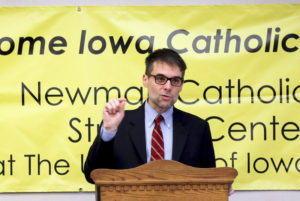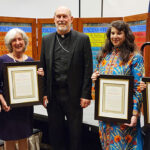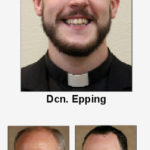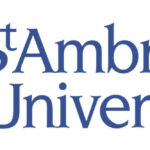By Michael Bayer
For The Catholic Messenger
IOWA CITY — Pope Francis opposes efforts to fit the Catholic Church into a pre-existing ideological framework. The Holy Father experienced firsthand what sort of effects this line of thinking could produce when he was a young priest, and later bishop, in Argentina.

Massimo Faggioli speaks at the Newman Catholic Student Center in Iowa City on Nov. 1.
That’s the opinion of Professor Massimo Faggioli, an internationally recognized Vatican II scholar and director of the Institute for Catholicism and Citizenship at the University of St. Thomas in St. Paul, Minnesota. He shared his thoughts Nov. 1 at the Newman Catholic Student Center in Iowa City.
Faggioli focused on how divisions within the American political system often seep into our discussions as a church. “The United States has a two-party political system, and so we wind up with a two-party church,” he asserted.
The theologian refuted efforts to cast Pope Francis as either a liberal or conservative, attesting that such a categorization makes no sense in light of the pope’s statements. With respect to the messiness of the recent World Synod of Bishops on the Family, Faggioli insisted that this was the result of the open discussion Pope Francis had called for. The theologian likened it to the debates of the Second Vatican Council. Attempts by some observers in the United States to depict Pope Francis as leading the church into heresy were reflective of how the pope’s leadership has challenged many to reexamine their existing ideological commitments. “Pope Francis threatens not the theological doctrines of American Catholicism, but the political doctrines,” Faggioli summarized.
He characterized “Laudato Si” as an encyclical more properly understood as being about power than about science. Pope Francis accepts the consensus of scientists with respect to global climate change. His encyclical is about asking what structures of power are contributing to this injustice and who will be most disproportionately impacted (the poor).
Faggioli concluded by expressing a desire that bishops and theologians once again be in closer dialogue and work collaboratively to explore matters of the faith. He lamented what seems to be a relative entrenchment of various groups within the church and hoped that Pope Francis’ model of facilitating open discussion might filter down to the local level.
“Dr. Faggioli’s talk was a reminder of Pope Francis’ objective to enliven and unite global Catholicism. The lecture was a fresh reminder that we, as an American church, must seek to avoid binaries that reflect binaries in our two-party political system,” observed Matt Peisen, a graduate student in Hispanic literature.
“Massimo is such an intelligent man. He not only got me thinking about what’s going on in the Catholic Church today, but also intrigued me to want to learn more. I didn’t know much of anything about Vatican II or Pope Francis, for that matter, before this presentation. I now feel more confident than ever that I have a good base to begin discovering more about my faith and its modern developments,” said Lindsay Herra, a junior at the University of Iowa.
“Massimo’s talk was very informing, but I also realized how much I do not know about what is going on in the Vatican … I believe learning more about it will help me grow as a member of the Catholic community,” said Taylor Majher, a University of Iowa sophomore.
“Dr. Faggioli addressed an urgent need: that the polarization and fragmentation in American society and politics, not be adopted in the church. It’s an American temptation right now. The alternative to civil war isn’t ‘the bland leading the bland,’ but good faith and the open-ended task of listening and discernment. Massimo embodies this and motivates us as students to do the same,” observed Jeff Boone, a community member.
(Michael Bayer is director of Outreach and Education for the Newman Catholic Student Center at the University of Iowa.)











